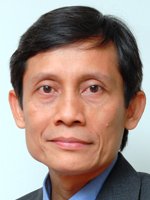TVET@Asia Issue 8: TVET Quality Improvement Initiatives in the Wake of ASEAN Economic Community 2015
The year 2015 marks the beginning of ASEAN Economic Community, which is affecting the lives of 622 Million people and creating the third largest economy in Asia. TVET is the educational sector that vastly contributes towards the quality of living and societal development. Regional TVET systems need to continuously develop and readjust to a changing environment in globalized competition on national and regional level. Relevant issues such as emerging TVET programmes, readjustment of curriculum contents, quality assurance, labor market information, recognition of qualifications across country and region, and sustainability are some areas that need special attention.
SEAMEO VOCTECH, which is located in Brunei Darussalam, is the Regional Centre for
Vocational and Technical Education and Training. As an entity of the Southeast Asian Ministers of Education Organisation (SEAMEO), it is responsible for the development of Technical and Vocational Education in Asia. The present 8th Issue of TVET@Asia is based on the International TVET Conference “Ensuring Greater Impact of TVET for Sustainable Development”, which was conducted by SEAMEO VOCTECH in Brunei Darussalam on the 1st and 2nd of June 2016.
The 8th Issue of TVET@Asia comprises eight papers that address some of most relevant topics with respect to the broad field of TVET as an educational sector relevant for economic and societal development. The papers are intended to contribute to the development of TVET in the region in response to ASEAN integration, especially in the area of TVET quality improvement initiatives, regionalization and harmonization of TVET, curriculum improvement that consider new content relevant to the widening geographical market demands of TVET, strengthening the roles of public and private sectors in TVET, and integrating sustainability in TVET policy and practices.
CALEB CHIDOZIE CHINEDU and WAN AZLINDA WAN-MOHAMED from Universiti Tun Hussein Onn Malaysia contribute with an article, which is titled Realigning Sustainable Development (SD) Goals for Industry and TVET Training Programs: A Crucial Undertaking. The authors explore – within the Malaysian context – industry and TVET professionals’ perspectives in relation to Sustainable Development, and discuss strategies to realign SD goals for the mutual benefit of educating and training competent vocational professionals for the mutual benefit of educating and training competent vocational professionals for a future industry.
The second article titled Brunei TVET Transformation: The Development of the Institute of Brunei Technical Education´s two Key Surveys is authored by SYAZANA EBIL, NORAZLINA OTHMAN, HJH NORHAKIMAH HJ MOHD NOR, MARLINAWATI HJ AHMAD, OMARALI MUJAH, & CHIN WEI KEH from the Institute of Brunei Technical Education (Brunei Darussalam). The article focuses on developing Key Performance Indicators of TVET institutions, based on the measurement of graduates’ employment rate and employers’ satisfaction towards TVET graduates’ performances. The paper shares the experience of developing and conducting the surveys, identifying some of the challenges faced and finally offers several recommendations.
MARCELINO C. GAPULTOS Jr. from SEAMEO VOCTECH (Brunei Darussalam) examines in his paper: The Corporate Image Building Programme of TVET Institutions in the Socialist Republic of Vietnam. In this paper he discusses several Corporate Image building (CIb) activities for TVET institutions of the Socialist Republic of Vietnam as perceived by its school administrators. He claims that TVET institutions are often perceived as second class and inferior to colleges and universities offering academic degrees, which underpins the relevance of his paper for the region.
ANA A, YEYET ROSTIKA, ADE JUWAEDAH, ASEP SETIADI, and INU HARDIKUSUMAH from Universitas Pendidikan Indonesia (UPI) present their research work in an article titled The Effect of Personal Traits to Entrepreneurship Intention of Students at Tourism Vocational High Schools in Bandung. The group of researchers from Bandung investigates the effects of various personal traits on students’ entrepreneurship intentions in the field of tourism at vocational high schools. The findings may be used as an input for schools, government agencies and policy makers to stimulate and encourage youth entrepreneurial interest.
SYAZWANI NUR AFIDA PG MAHMUD and CHIN WEI KEH from Brunei Institute of Technology Education (Brunei Darussalam) contribute the fifth article, which they titled A Study on the Use of Feedback to Improve Assessment of Life Skills in Mechanical Engineering Courses. The authors examine a selection of teaching and assessment methods, i.e. feedback methods that can develop life skills more effectively. The authors define Life Skills as a crucial aspect in engineering practice and as a precondition for a lifelong employability.
PHOUNG CHI DIEP from Ho Chi Minh City University of Technology Education (Vietnam) contributed the sixth article, which she titled Solutions for the Improvement of Regional TVET Quality in the Wake of ASEAN Economic Community (AEC). The paper offers a number of solutions in order to deal with various relevant TVET issues on a regional level. Issues under consideration include; assuring high levels of training quality, mutual recognition of qualifications at regional level, and the lack of quantity and quality of TVET teachers and instructors to prepare graduates not only for working in their country but in the entire region.
KIRAK RYU from KRIVET (South Korea) examines in his article, Localization of TVET Governance in Korea, the process of decentralising skills development systems and explains the roles of major stakeholders, especially the central government’s role in the transition process. In addition, the paper also summarizes main challenges that the new TVET governance confronts, and puts forward policy suggestions. The Korean TVET system is widely acknowledged by the international community for its great achievements in terms of effectiveness and efficiency.
FARUQUE AHMET HAOLADER, DAVUT CICOGLU, and KALINAKI KASSIM (Bangladesh) contribute an interesting paper on A Model of Technical and Vocational Teacher Education at Bachelor’s Degree Level and its Relevance with Occupational Tasks of TVET Teachers in the OIC Member States. The Organization of Islamic Conference (OIC) comprises 57 member states and 5 states with observer status, which demonstrates the enormous reach of this study program. The paper evaluates the TVET teacher education model offered by the Islamic University of Technology (IUT) at Bachelor’s Degree level in terms of its relevance for the occupational tasks of a TVET teacher. The paper discusses the model´s strengths and limitations, and it examines the effectiveness of the curriculum based on the perception of the teachers.
The above depicted papers, based on experiences from a number of countries from Southeast Asia (Brunei Darussalam, Indonesia, Malaysia, and Vietnam), South Asia (Bangladesh) and East Asia (South Korea), offer insight in various perspectives on the journal´s theme of TVET Quality Improvement Initiatives in the wake of regional integration. The variety of perspectives demonstrates that different approaches are inevitably necessary to cover all aspects of TVET in such a divers region as Southeast Asia and it fully demonstrates that action-research projects in cooperation with training institutes incents a continuous development of quality in TVET. TVET systems and institutional research on TVET systems form a powerful unity that literally represents SEAMEO VOCTECH´s motto: “TOGETHER WE EXCEL!”
Thank you to the contributors and please enjoy reading!
The editors of Issue 8
Paryono Paryono, Georg Spöttl, Thomas Schröder, and Adeline Goh
Citation
Paryono, P., Spöttl, G., Schröder, T., & Goh, A. (2017). Editorial Issue 8. TVET Quality Improve-ment Initiatives in the Wake of ASEAN Economic Community 2015. In: TVET@Asia, issue 8, 1-3. Online: https://www.tvet-online.asia/issue8/editorial_paryono_etal_tvet8.pdf (retrieved 28.01.2017).





